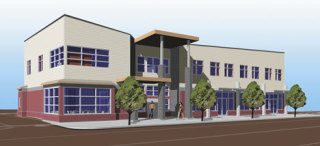FREELAND — Freeland Lanes is about to be knocked off its pins.
Owner Steve Myers plans to tear down the landmark bowling alley on Harbor Avenue and put up a retail/office building.
“It’s unfortunate that it’s happening,” Myers said Thursday. “It just didn’t appear to be a viable business, which is really too bad. There was some interest, but no takers.”
“I would have liked to have seen it stay open,” added Myers, who said that as a youth growing up in Bayview, he spent hours playing pool at the lanes. “It would obviously be cheaper for me if it stayed a bowling alley.”
Myers, the owner of Sound Electric, built the commercial buildings next door that are anchored by Radio Shack. He plans a two-story, 10,800-square-foot structure on Freeland Lanes’ two lots.
Plans include space for three retail businesses on the ground floor, with four office suites above. Myers said it will be a “green” building, including solar panels on the roof to heat water, and a 1,700-gallon tank beneath the ground to catch rain runoff for irrigation and other water recycling.
There will be parking for
40 vehicles, and Myers is considering making six of the spaces plug-in stations for electric cars.
“We want to make this as user-friendly as possible,” he said.
Myers said the exterior of the new building will have features similar to those next door, but not identical. The architect is Carlos Sienna Martin of Bellevue.
Myers said he’s not sure yet how much the project will cost, and he has yet to begin looking for tenants. He said he is gathering pricing data, and has started the permit process.
Construction probably will begin next spring, he added.
Myers said he bought the property three years ago with the idea of keeping it as a bowling alley until redeveloping it in the future.
“I just didn’t know the future would be coming so fast,” he said.
“But I’m in the business of leasing property.”
Freeland Lanes, South Whidbey’s only bowling alley for 50 years, closed in June.
In its heyday in the 1960s and ‘70s, it was a hub for many in the South End.
When its closure was announced, avid bowlers collected petition signatures to send to state elected officials urging that something be done to keep it open.
Freeland Lanes operator Roger Simmons of Clinton, who was leasing it from Myers, said Thursday that insurance, the rising expense of real estate and other operating costs amounted to more than revenue could cover, even after a busy winter.
“I’m really sorry that it’s going to be torn down,” Simmons said. “A lot of people are going to miss it.”
“I’ve known Steve for a number of years,” he added. “But he’s a businessman.”
Simmons said community support was strong in the Lanes’ last year, especially among seniors, families and teens, but that the equipment is old and expensive to maintain. His costs continued to rise, as well.
Simmons said hard times have become familiar in the bowling business, which is mostly seasonal and requires a lot of space in an era of increasing property values.
He said Seattle at one time had 28 bowling alleys, but now there are only three.
After a drop-off in popularity, however, bowling is beginning to make a comeback, added Simmons, whose family has been in the business for years.
“I just wish something could have been worked out,” Simmons said. “But
I guess it’s not going to happen.”
Myers said he would like to offer the equipment free to a church or public agency, such as the parks department, so that bowling could continue at another location for people on the South End.
“Diversity in recreation is important in any small community,” he said, but added of Freeland Lanes: “It just didn’t seem to be working as a private business.”



